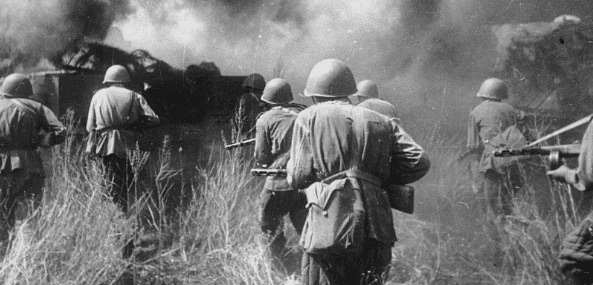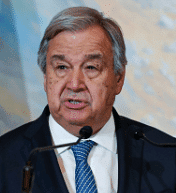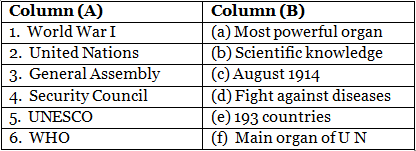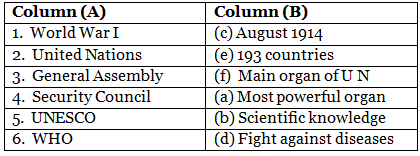The United Nations - 2 Class 5 Worksheet SST
Q1: Fill in the Blanks
(i) The Second World War broke out in __________.
 (ii) The United Nations was born in the year __________.
(ii) The United Nations was born in the year __________.
(iii) The U N has __________ different organs or bodies.
(iv) The __________ is responsible for maintaining international peace.
(v) __________is the present Secretary – General of the U N.
Ans:
(i) 1939
The Second World War began on September 1, 1939, when Germany invaded Poland, leading to a series of conflicts involving various nations across the world.
(ii) 1945
The United Nations was officially established on October 24, 1945, after the conclusion of World War II. The UN aimed to promote international cooperation and prevent future conflicts.
(iii) six
The United Nations consists of six main organs: the General Assembly, the Security Council, the International Court of Justice, the Secretariat, the Economic and Social Council (ECOSOC), and the Trusteeship Council (which was suspended in 1994 after all trust territories gained independence).
(iv) Security Council
The Security Council is one of the principal organs of the United Nations and is primarily responsible for maintaining international peace and security. It can take various measures, including sanctions and military interventions, to address threats to peace.
(v) António Guterres
António Guterres, a Portuguese diplomat, has been serving as the Secretary-General of the United Nations since January 1, 2017. The Secretary-General is the head of the Secretariat and plays a vital role in overseeing UN activities.
Q2: True or False
(i) During World War II, USA dropped atomic bombs in two Chinese cities. ______
(ii) The Charter of the U N was signed by 50 countries. _______
(iii) The General Assembly meets every year. _______
(iv) The UNICEF is responsible for the welfare of children. _______
(v) India actively supported the policy of apartheid in South Africa. ________
(vi) There are five permanent members in the U N Security Council. _________
(vii) The main aim of W H O is “freedom from hunger”. _________
Ans:
(i) True: The USA dropped atomic bombs on the Japanese cities of Hiroshima and Nagasaki in August 1945, towards the end of World War II.
(ii) False: The Charter of the United Nations was signed by 50 countries in San Francisco on June 26, 1945, establishing the UN. However, the charter was eventually ratified by a total of 51 founding member countries.
(iii) True: The General Assembly of the United Nations is the main deliberative body of the organization and meets annually in regular sessions to discuss and address international issues.
(iv) True: The United Nations Children's Fund (UNICEF) is a UN agency dedicated to promoting the rights and well-being of children around the world through various programs and initiatives.
(v) False: India was a vocal opponent of apartheid, the racially discriminatory policy in South Africa. India actively supported the international movement against apartheid and played a significant role in pushing for sanctions against the South African regime.
(vi) False: There are five permanent members with veto power in the United Nations Security Council: the United States, Russia, China, France, and the United Kingdom. However, there are a total of 15 members in the Security Council, with 10 non-permanent members serving two-year terms.
(vii) False: The main aim of the World Health Organization (WHO) is to promote international public health. Its goals include preventing disease, providing healthcare services, and improving health conditions globally.
Q3: Match the following

Ans:
Q4: Short Answer Type Questions
(i) The Secretary – General is the most powerful person in the Secretariat. Give reason.
Ans: The Secretary-General is the most powerful person in the Secretariat because they are the chief administrative officer of the United Nations and serve as the leader of the Secretariat, which is responsible for implementing UN policies and programs. The Secretary-General plays a significant role in shaping the organization's agenda, representing the UN in various international forums, and promoting diplomatic efforts to address global issues. Their influence also extends to facilitating cooperation among member states and guiding the work of the UN agencies, funds, and programs.
(ii) Write a short note on UNICEF
Ans: UNICEF (United Nations Children's Fund) is a UN agency focused on promoting the well-being and rights of children worldwide. It provides humanitarian aid, advocates for children's rights, and supports initiatives to improve children's health, education, protection, and overall living conditions. UNICEF works to ensure that every child has access to clean water, nutrition, education, and protection from violence and exploitation. It collaborates with governments, NGOs, and communities to create positive and lasting impacts on children's lives.
(iii) Write any three achievements of the UN
Ans: Three achievements of the UN are:
- Peacekeeping: The United Nations has successfully organized and conducted numerous peacekeeping missions around the world, helping to mitigate conflicts, stabilize regions, and facilitate post-conflict reconstruction.
- Universal Declaration of Human Rights: The UN played a pivotal role in formulating and adopting the Universal Declaration of Human Rights in 1948, setting out fundamental rights and freedoms that should be protected for all individuals globally.
- Sustainable Development Goals (SDGs): The UN established the 17 SDGs in 2015, aiming to address a wide range of global challenges, including poverty, inequality, climate change, and more, by 2030. These goals provide a comprehensive framework for international development efforts.
(iv) Write a short note on ECOSOC
Ans: ECOSOC (Economic and Social Council) is one of the principal organs of the United Nations, responsible for promoting international economic and social cooperation and development. Key points about ECOSOC:
- It consists of 54 member states elected by the UN General Assembly for three-year terms.
- ECOSOC acts as a platform for discussions on international economic and social issues, and it coordinates the work of various specialized agencies, funds, and programs of the UN.
- The council plays a role in setting global development priorities and advancing the Sustainable Development Goals (SDGs) by facilitating dialogues, organizing forums, and promoting policy coherence and coordination among member states.
(v) What are the aims of the U N?
Ans: The aims of the U N are:
- Maintain international peace and security: The UN seeks to prevent conflicts and facilitate peaceful resolutions to disputes through diplomacy, peacekeeping missions, and the Security Council's efforts.
- Promote human rights: The UN strives to protect and uphold human rights globally, advocating for civil, political, economic, social, and cultural rights for all individuals.
- Foster social and economic development: The UN works to eradicate poverty, hunger, and inequality, while promoting sustainable development, education, healthcare, and gender equality.
- Provide a platform for international cooperation: The UN serves as a forum where nations can collaborate on global challenges such as climate change, environmental protection, terrorism, and health crises.
(vi) Write a short note on the U N General Assembly.
Ans: The U N General Assembly is the main deliberative body of the United Nations, consisting of all member states. Key features of the General Assembly:
- It meets annually in regular sessions to discuss and make decisions on various international issues, including peace and security, development, human rights, and more.
- Each member state has one vote, and decisions on important issues require a two-thirds majority, while other matters are decided by a simple majority.
- The General Assembly elects non-permanent members of the Security Council and appoints the Secretary-General based on recommendations from the Security Council.
- The General Assembly's resolutions, although not legally binding, carry considerable political weight and reflect the collective will of the international community.
|
33 videos|376 docs|50 tests
|
FAQs on The United Nations - 2 Class 5 Worksheet SST
| 1. What is the United Nations and what is its purpose? |  |
| 2. How is the United Nations structured? |  |
| 3. How does the United Nations work to maintain international peace and security? |  |
| 4. What are some of the major achievements of the United Nations? |  |
| 5. How can individuals and NGOs get involved with the United Nations? |  |





















